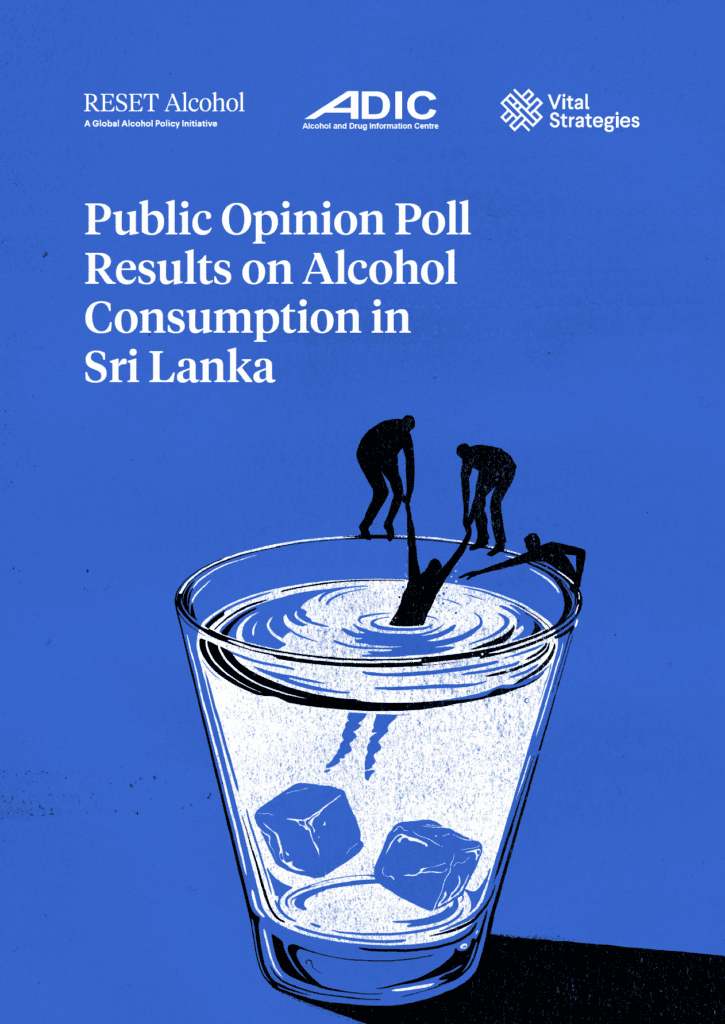The price of alcohol was cause for debate in the recent parliament debates in Sri Lanka. This was following the recommendations of the International Monetary Fund to increase taxation on alcohol and tobacco products. This course of action would both help the state strengthen its revenue while protecting people from alcohol harm.
However, the recommendation is being met with significant political pushback. Alcohol industry lobbyists, front groups, and politicians doing the dirty work for alcohol companies claim that the public would not welcome raising alcohol taxes, citing cost of living concerns.
But timely research conducted by the Alcohol and Drug Information Center (ADIC) and Vital Strategies under the RESET Alcohol Initiative in the country has revealed the truth about people’s attitudes, knowledge, and support for alcohol policy. The results of the opinion survey were unveiled at a research launch event that publicised four studies related to alcohol taxation in the country.
Majority of people concerned about alcohol burden in Sri Lanka
The survey found that there is a clear disconnect between the opinions of the public and their representatives.
An overwhelming 97% of the adults included in the survey stated that alcohol consumption is a problem in the country. 79% of the people even believe that it is a major problem in the country.
61% of respondents said that alcohol consumption was a problem in the country despite being consumers themselves.
It is clear therefore that Sri Lankan society is welcoming of alcohol policy change.
Other key findings from the opinion survey
The opinion survey is a representative poll of the attitudes and knowledge of people in Sri Lanka concerning alcohol harm and policy solutions.
- There is a clear gender dimension in how alcohol is viewed in the country.
- 84% of all women believed that alcohol was an issue in the country while 76% of men believed the same.
- The largest concern about alcohol consumption in the country is the link to domestic violence.
- 64% of respondents do not believe that current laws and regulations provide sufficient protection against alcohol harm.
- 39% of people say they have been exposed to alcohol advertising despite advertising bans in the country.
- 75% of survey respondents believe that alcohol taxation is an effective way of reducing alcohol consumption in Sri Lanka.
Results of opinion survey are a clear call for accelerating action on alcohol
There is a clear need and vast support for alcohol policy action in Sri Lanka, inclduing raising taxes and protecting people better from alcohol advertising.
Making alcohol policy a national priority would benefit people, families, and communities across Sri Lanka. And it would benefit the economy and government budgets. The research cited at the Research Launch Event made the socioeconomic cost of alcohol harm clear.
The estimated value of economic cost due to alcohol harm in Sri Lanka in 2015 was USD 885.86 million, 1.07% of the GDP of that year.
According to the data cited,
- Alcohol has been identified as the cause for deaths of about 4,000 individuals per 100,000 people in Sri Lanka.
- A state has to pay up to three times more than it earns by providing healthcare caused directly and indirectly due to alcohol harm.
- Despite the ongoing economic crisis of, less than 10% of alcohol consumers in the country consume illicit alcohol (kasippu), which coincides with figures before the economic crisis.
This means that price increases in Sri Lanka do not result in alcohol consumers switching to illicit alcohol. This claim is frequently made by alcohol industry lobbyists, front groups, and politicians doing the dirty work for alcohol companies to block the much-needed and life-saving alcohol tax increases in the country.
Sri Lanka on the Road for Incremental Positive Policy Changes
The Sri Lankan government has already implemented two tax increases since the start of 2023.
Each of these tax increases amounted to a 20% increase in price.
Alcohol harm in the country can be expected to decrease following these policy improvements. It will also provide the government with the much-needed revenue to strengthen social security in the country.
Organizations such as the Alcohol and Drug Information Center also remain committed to advocating for policies that will further protect people from alcohol harm and boost development for all
The President and Vice President of Movendi International also presented their ideas at the Research Launch Event.
Speaking at the event, Movendi International President Kristina Sperkova said:
Education and awareness building to change societal norms is important, but focusing on the individual alone isn’t enough.
We need to focus on the environment by limiting alcohol availability in communities, and other environmental or external factors.
And a public health oriented, evidence-based alcohol tax policy is the single most effective solutions to reduce alcohol harm and costs, promote health, and generate government revenue.”
Kristina Sperkova, President, Movendi International
Movendi International Vice President Pubudu Sumanasekara had the following to say:
Establishing the public perception of alcohol is vital in justifying and implementing positive policy changes.
The next step is carrying the results of these studies forward into policy reform. Its imperative that civil society, academics, professionals, and government officials direct their collective effort to ensure that the changes the people truly want do take place.”
Pubudu Sumanasekara, Vice President, Movendi International
Sources :
Ceylon Today – Lengths of Our Drinking Problem
Public Opinion Poll Results on Alcohol Consumption in Sri Lanka

